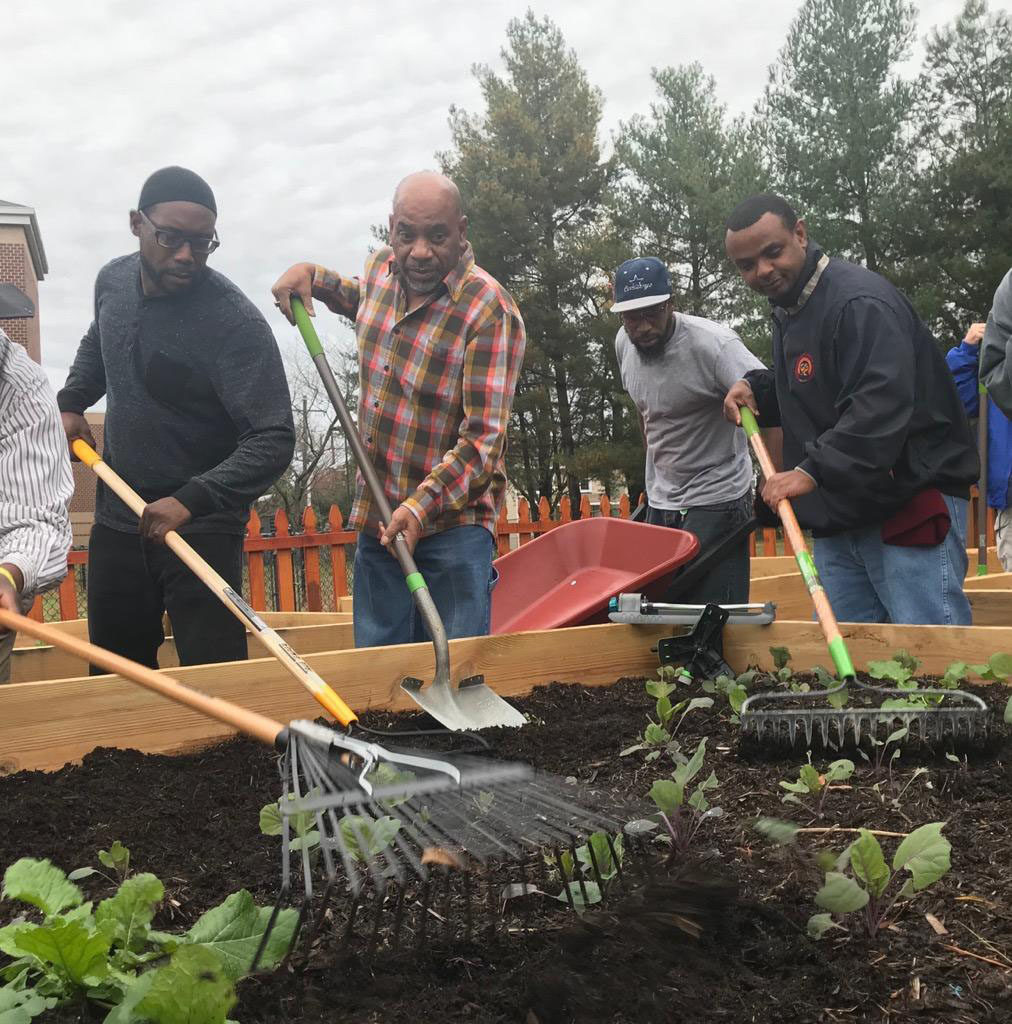Sowing Seeds of Wellness
“Addiction is not a choice,” said Carolyn Seaman, director of development for the Richmond Behavioral Health Foundation (RBHF). “It is a powerful disease.”

Residents of the Richmond Behavioral Health Authority work in the Kitchen Garden as part of their treatment. Photo by Reginald Jenkins
Seaman, who has 12 years of related experience, said no one chooses to compromise their health or lose their livelihood and home
due to substance abuse. Nor do they choose to alienate family or place children in harm’s way. These are realities of addiction, as are emergency department visits and deaths from overdose.
Richmond knows the consequences all too well. The city has one of the highest rates of death from heroin overdose in the state.
Organizations like RBHF and the Richmond Behavioral Health Authority (RBHA), as well as state and local governments, constantly pursue treatment options because what helps one user may not work well for another. Seaman said every resource is considered as a potential avenue for long-term recovery – even gardening.
RBHA’s North Campus, formerly operating as Rubicon, Inc., provides residential substance use disorder treatment. Up to 186 men, women and women with their children reside at the organization’s campus in the Highland Park neighborhood. RBHA recently added gardening and outdoor programming as a treatment component with hopes more residents not only achieve but maintain long-term recovery.
“We established the Kitchen Garden at our residents’ request,” Seaman said. In October Hands on Greater Richmond, Ginter Urban Gardeners and 60 Altria volunteers upgraded a tiny vegetable garden with four raised garden beds and a 20-tree fruit orchard. Nearby, they built a pergola.
“Therapeutic horticulture is an intervention that uses nature or plant-related activities to improve physical, psychological and social well-being said Theodora Appiah-Acheampong, RBHA program manager at the Men’s Residential Treatment Center. “As part of our daily schedule, evening gardening and social settings help residents learn to work together and focus on solutions to their emotional needs.”
Whether watering, planting or pruning, residents practice teamwork and conflict resolution. They exercise responsibility and initiative, which develops pride. Therapeutic gardening is a relaxing distraction, so it also helps addicts sustain sobriety.
The Kitchen Garden dovetails another RBHA initiative launched last summer. A four-week culinary arts program is based on the farm-to-table concept. RBHA participants earn a food-preparation certificate after completing training in food production, preparation and presentation. They use the fresh vegetables when preparing meals, which further supports their health and well-being.
“Every day, countless individuals struggle—noticed and unnoticed—to fight this disease,” Appiah-Acheampong said. “Too many die … but treatment can work, and recovery is possible.”
RBHF is pursuing funding opportunities to expand the therapeutic horticulture program at the North Campus. Funding would subsidize an on-site therapeutic horticulturist and programming needs, as well as a greenhouse for year-round involvement.
“We hope to develop a horticulture certificate program, too,” Seaman said. “The grounds would become the classroom.”
Youngsters living with their mothers on the North Campus also would benefit. Campus plans support green spaces for physical exercise and creative play, fostering healthy relationships, positive problem-solving skills and resiliency.
RBHA and its partners await positive outcomes. Therapeutic horticulture is expected to harvest hope and help save lives.
This article first published in the Richmond Times-Dispatch in December 2018.